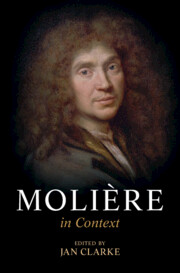Book contents
- Molière in Context
- Molière in Context
- Copyright page
- Dedication
- Contents
- Figures
- Charts and Tables
- Contributors
- Acknowledgements
- Translations
- Abbreviations
- Biographical Preface
- Part I Socio-Political Context
- Part II Intellectual and Artistic Context
- Part III Theatrical Context (Paris)
- Part IV Theatrical Context (Court)
- Chapter 18 Colbert, Cultural Policy and the Propaganda of Spectacle
- Chapter 19 The Decors of Comedy-Ballet: From the ‘Songe de Vaux’ to the ‘Rêve de Versailles’
- Chapter 20 Court Performances and Their Audiences
- Chapter 21 Music
- Chapter 22 The Livrets of Molière’s Plays
- Part V Reception and Dissemination
- Part VI Afterlives
- Further Reading
- Index
Chapter 18 - Colbert, Cultural Policy and the Propaganda of Spectacle
from Part IV - Theatrical Context (Court)
Published online by Cambridge University Press: 10 November 2022
- Molière in Context
- Molière in Context
- Copyright page
- Dedication
- Contents
- Figures
- Charts and Tables
- Contributors
- Acknowledgements
- Translations
- Abbreviations
- Biographical Preface
- Part I Socio-Political Context
- Part II Intellectual and Artistic Context
- Part III Theatrical Context (Paris)
- Part IV Theatrical Context (Court)
- Chapter 18 Colbert, Cultural Policy and the Propaganda of Spectacle
- Chapter 19 The Decors of Comedy-Ballet: From the ‘Songe de Vaux’ to the ‘Rêve de Versailles’
- Chapter 20 Court Performances and Their Audiences
- Chapter 21 Music
- Chapter 22 The Livrets of Molière’s Plays
- Part V Reception and Dissemination
- Part VI Afterlives
- Further Reading
- Index
Summary
Working through an official system of academies, as well as through a more informal institution known as the Little Academy (Petite Académie), Louis XIV’s finance minister Jean-Baptiste Colbert controlled a wide-ranging propaganda of absolutism or, in the language of the time, a memorialising of the monarch’s gloire. This chapter investigates the strategy and mechanisms by which Colbert and his collaborators deployed the arts as an instrument of the state. It explores the ways in which Molière’s comedies and comedy-ballets developed out of an established system of courtly propaganda in the court ballet of the 1650s and 1660s, and examines changes instituted by Colbert in the 1660s. Finally, it examines Molière’s ambivalent response to the absolutist enterprise as expressed through these changes.
- Type
- Chapter
- Information
- Molière in Context , pp. 175 - 182Publisher: Cambridge University PressPrint publication year: 2022

